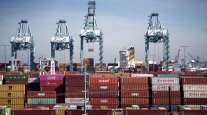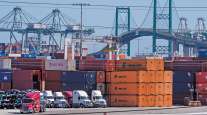Coalition Urges Donald Trump, Lawmakers to Remember Ports in Infrastructure Debate

A coalition of the top three containerports, two private terminal operators and two industry analysts wrote a letter to President Donald Trump and Congress to urge lawmakers not to forget the ocean freight industry during the debate on infrastructure.
The Coalition For More Efficient Ports said that 90% of U.S. international trade travels through marine ports, supporting 23 million jobs and generating $321 billion in tax revenue in 2015. But the group added that the infrastructure at these ports is outdated and threatens to interrupt the supply chain.
The ports of Los Angeles, Long Beach and New York-New Jersey; Ports America Group, SSA Marine, the Agriculture Transportation Coalition and the Retail Industry Leaders Association make up the group.
“Unfortunately, traditional federal infrastructure funding programs are generally not comprehensive enough to support the size and scale of the investments needed at U.S. ports,” the letter states. “Most port infrastructure investment is now made by private, state, and local sources — which means that investments often lack the necessary strategic and targeted approach that only the federal government can provide. Your infrastructure package represents a historic opportunity to recalibrate U.S. infrastructure policy to ensure the future success of U.S. ports in a way that is commensurate with their economic and strategic importance.”
Meanwhile, the Federal Maritime Commission will take up the issue of port congestion, detention, demurrage and per diem charges to motor carriers and beneficial cargo owners Jan. 16-17 in Washington.
The Coalition for Fair Port Practices, a group of more than 20 trade associations, filed a petition with the commission to urge rulemaking to combat what it described as unfair demurrage and detention charges leveled against shippers because their contract motor carriers couldn’t retrieve containers within the assigned “free time” through no fault of their own.
The petition lists several examples in which the fees were charged during questionable circumstances, including the 2015 labor slowdowns on the West Coast, infrastructure breakdowns, severe weather and the Hanjin bankruptcy in August 2016.
The commission will explore whether it can craft a rule that could be universally applied nationwide on the issue.




